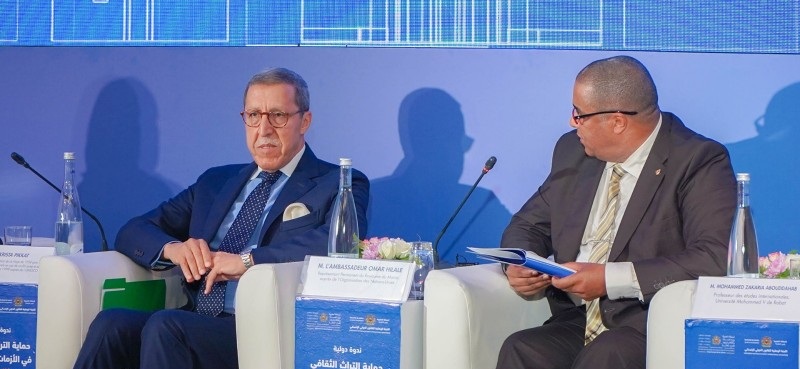Global Experts Convene in Rabat: Rallying for Cultural Heritage Amid Crisis
In a world where conflict and upheaval increasingly threaten our shared history, Rabat became the epicenter of a crucial dialogue on Tuesday. The Moroccan capital hosted an international symposium titled "Protection of Cultural Heritage during Humanitarian Crises and the Issue of Effectiveness," marking the 70th anniversary of the Hague Convention for the Protection of Cultural Property in the Event of Armed Conflict.
Organized by Morocco's National Commission on International Humanitarian Law, the event brought together luminaries in the field to tackle the escalating challenges faced by cultural treasures worldwide. The symposium's first session, "The Protection of Cultural Property during Humanitarian Crises and the Challenges of Implementation," set a tone of urgency and intellectual rigor.
Professor Mohammed Zakaria Abouddahab from Mohammed V University of Rabat moderated the session, guiding discussions that delved into the complex tapestry of issues surrounding cultural heritage protection. The discourse was elevated by the presence of Ambassador Omar Hilale, Morocco's Permanent Representative to the United Nations, who delivered a stirring address on the UN's role in safeguarding cultural property during humanitarian crises.

Hilale's speech resonated with both emotion and pragmatism. "Cultural heritage is a testament to our history and identity," he declared, his words painting vivid images of endangered treasures. "Its destruction not only erases our past but also threatens our future." The ambassador's narrative wove together tales of looted manuscripts and razed ancient cities, serving as both a lament for what has been lost and a clarion call for action.
The urgency of Hilale's message was palpable as he urged for a multidisciplinary approach to protection. His vision encompassed a coalition of international organizations, local authorities, military forces, and civil society, united in creating a more robust defense for our shared cultural legacy.

Following Hilale's impassioned plea, Krista Pikkat, Secretary of the 1954 Hague Convention and its protocols, took the floor. Pikkat's discourse centered on practical solutions and the critical role of international cooperation. She commended Morocco's dedication to cultural preservation, both within its borders and on the global stage.
Pikkat emphasized the intrinsic link between culture and community resilience. "As a visible expression of the bond between communities, culture is a powerful vector for reconciliation and a cornerstone for social proximity," she stated. Her words underscored the dual threats of physical destruction and illicit trafficking that imperil cultural artifacts during conflicts.
 th
th
The symposium's discussions repeatedly circled back to the vital importance of international legal frameworks. The Hague Convention and its protocols emerged as central pillars in the global effort to protect cultural heritage. Pikkat noted the encouraging progress in treaty ratification, with 135 out of 194 UNESCO member states having ratified the Convention, 112 the first protocol, and 88 the second protocol.
However, the speakers unanimously agreed that more work remains. "The Hague Convention and its protocols provide a solid framework for cultural solidarity," Pikkat observed. "However, their effectiveness depends on meticulous preparatory efforts during peacetime."

As the symposium concluded, the message was clear: the protection of cultural heritage is not merely about preserving artifacts and monuments. It is about safeguarding the very essence of human identity and fostering resilience in the face of conflict. The gathering in Rabat served as a powerful reminder that in our shared cultural tapestry, every thread is precious, and the global community must stand united in its preservation.
The discussions in Rabat have set the stage for renewed international commitment and cooperation. As the world continues to grapple with conflicts that threaten our shared heritage, the insights and strategies developed at this symposium may prove crucial in turning the tide. The battle for our cultural legacy is far from over, but events like these kindle hope for a future where our past is preserved for generations to come.
Lire aussi
Latest News
- Yesterday 19:08 Moroccan Star Manal Challenges Social Norms with 'Cabaret'
- Yesterday 13:10 Moroccan Artistry Takes Center Stage at Paris Design Week 2024
- Yesterday 13:00 Dick Cheney Crosses Party Lines: Endorses Kamala Harris for President
- Yesterday 12:45 Moroccan Expats in Italy Face Ongoing Driver's License Hurdles Despite New Agreement
- Yesterday 12:30 Super Typhoon Yagi Ravages Northern Vietnam: Major Disruptions and Widespread Damage
- Yesterday 12:13 China Unveils $50 Billion Plan to Boost Africa's Development at FOCAC 2024
- Yesterday 12:00 French Left Protests Michel Barnier's Appointment as Prime Minister



